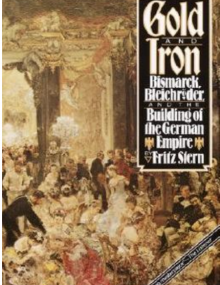
Book: Gold and Iron: Bismark, Bleichroder, & the Building of the German Empire
Fritz SternIn 1862, shortly after taking office in the midst of a parliamentary crisis over defense spending, Prussian Minister-President Otto von Bismarck famously argued: “The position of Prussia in Germany will not be determined by its liberalism but by its power…. Not through speeches and majority decisions will the great questions of the day be decided—that was the great mistake of 1848 and 1849—but by iron and blood.” (This expression was popularly transposed as “blood and iron.”) As Columbia University historian Fritz Stern brilliantly demonstrated in his classic Gold and Iron: Bismarck, Bleichröder, and the Building of the German Empire, other elements were involved in Bismarck’s invocation of Prussian and later German power. War and diplomacy require money. A modern economy as well as a modern armed force depends on iron. Gold and iron, furthermore, are not exclusively national products; at least in part they must be obtained, cultivated, and expended on the international stage.
Read More
